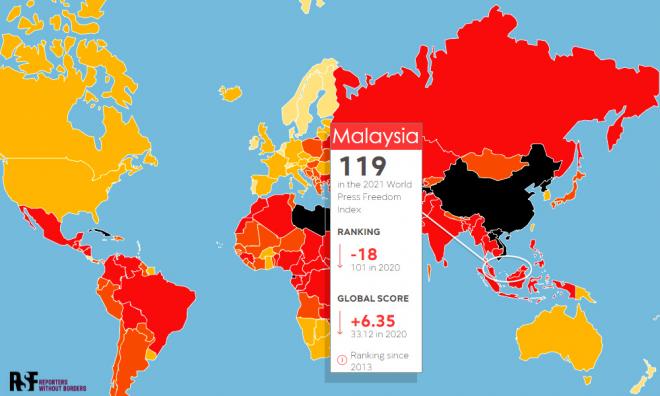Human rights watchdog: PN govt used pandemic to suppress freedoms
Once again, an international report has highlighted the decline in human rights in Malaysia and it doesn't stop short of claiming that the Perikatan Nasional government has used the Covid-19 pandemic to impinge on freedoms.
New Zealand-based Human Rights Measurement Initiative (HRMI) published the 'Human Rights during the Pandemic' report a few weeks ago, reviewing the state of human rights in 39 countries by analysing government responses to Covid-19 in 2020.
While most countries saw a decline in overall rights in 2020 compared to the previous year, Malaysia ranked on the lower end of the spectrum for almost all of the rights measured - namely in empowerment rights and economic and social rights.
HRMI Strategy and Communication head Thalia Kehoe Rowden told Malaysiakini that the team was struck by a dramatic drop in scores in both Malaysia and Hong Kong for empowerment rights from the year 2019 to 2020 among the sampled countries.
“For Malaysia, human rights experts told us that the government used the pandemic as an excuse to breach rights to freedom from arbitrary arrest and detention, and freedom of assembly and association.
“Experts further said that the government used the pandemic as a reason to silence critics and limit people's freedom of opinion and expression.
“The economic effects of the pandemic and the government response to it had an enormous effect on Malaysians' rights to food, education, health, housing, and work or adequate income, and exacerbated existing inequities in these areas,” she said.
A total of 39 countries were surveyed of all sizes and levels of wealth, from all regions of the world including Australia, Mexico, South Korea and the United States, among others.
Survey respondents were people who had professional, first-hand knowledge of the human rights situation in a country, such as journalists, researchers at NGOs, human rights lawyers and staff at independent National Human Rights Institutions.
Malaysia experienced a sharp decline in civil and political empowerment rights in the report from a score of 5.7 out of 10 in 2019 to 3.7 in 2020.
The three categories measured were the right to assembly and association, the right to opinion and expression and the right to participate in the government.
HRMI is the first of its kind
Founded in 2015, HRMI is a global, not-for-profit human rights data platform that aims to improve people’s lives by producing user-friendly, reliable information on the human rights progress of countries.
According to Thalia, it is the first global initiative to track the human rights performance of countries and that prior to its enactment there were no other objectives, comparable measurements of how governments were treating their people.
“At HRMI, we believe that what gets measured gets improved. Leaders need hard numbers to help motivate them to prioritise human rights.
“We help to improve people's lives by providing useful tools to help governments make decisions that put people's rights and wellbeing at the centre of their agendas,” she said.
Data for the website is produced on an annual cycle, taking about a year to measure civil and political rights, and a few months to produce the scores for economic and social rights.
This is just the latest report to pinpoint the issue as studies have indicated that press freedom in Malaysia had suffered a backslide since the collapse of Pakatan Harapan and ranked 119 out of 180 countries on Reporters Without Border's 2021 annual press freedom index.
Earlier this year, Malaysiakini was fined half a million ringgit over the readers' comments, while an investigation was conducted on CodeBlue’s Boo Su-Lyn over her articles pertaining to the Sultanah Aminah Hospital fire.
HRMI claimed there was a lack of data for a regional comparison, but compared with the other 38 sampled countries in the report, Malaysia performed worse than average in this category.
Refugees, migrants most disadvantaged
Meanwhile, under economic and social issues, migrants and refugees competed for first place among groups most likely to be affected - with 80 percent most likely to be affected in most of the categories.
Economics and social rights are measured based on the countries efforts to utilise the maximum available resources to them. In the report, these rights are further divided into five categories: education, food, health, housing and work.
HRMI claimed that Malaysia saw various potential human rights infringements in 2020 on migrants and refugees such as the following:
The detention of undocumented migrants and refugees in unsanitary conditions during the pandemic
The government used Covid-19 restrictions on freedom of expression to silence migrants and refugees, and their advocates.
Inadequate food is provided to those in detention centres. Police abuse and torture rose during the pandemic towards more vulnerable groups.
Migrants and refugees most at risk of illegal evictions occurred as a result of Covid-19.
Additionally, it was reported in July that US State Department would downgrade Malaysia to Tier 3 in its human trafficking report, indicating that the country has failed to comply with minimum standards for eliminating trafficking or make any significant efforts to comply. - Mkini
✍ Credit given to the original owner of this post : ☕ Malaysians Must Know the TRUTH
🌐 Hit This Link To Find Out More On Their Articles...🏄🏻♀️ Enjoy Surfing!





















Post a Comment